By: Humane Veterinary Hospitals – Reading Staff
Each year, more than 100,000 pets are accidentally exposed to toxins, resulting in emergency trips to the veterinarian or phone calls to Pet Poison Control hotlines.
What are the most common poisons and toxins ingested by pets, and where are they found?
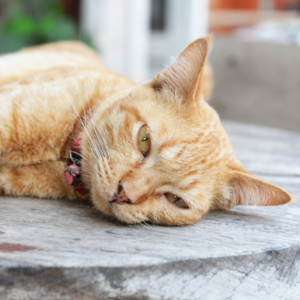 Not surprisingly, the greatest risks to pets are found around the home. Plants, foods, human medications, cleaning supplies, and automotive products are responsible for the vast majority of pet poisoning cases reported to veterinarians and poison control centers.
Not surprisingly, the greatest risks to pets are found around the home. Plants, foods, human medications, cleaning supplies, and automotive products are responsible for the vast majority of pet poisoning cases reported to veterinarians and poison control centers.
Here are a few of the most common, as reported by the Pet Poison Helpline and the ASPCA Animal Poison Control Center:
- More than 1,000 common plants can be toxic to pets. While not all toxic exposures are life-threatening, it is important to take any potentially harmful exposure seriously.
Lilies, azaleas, aloe vera, sago palm, English ivy, philodendron, hydrangea, poinsettia, dieffenbachia, and oleander are among the leading causes of poisoning among pets and should be avoided.
- Many foods that we commonly eat can also present a poisoning risk to pets. Highest on the list are products containing alcohol or caffeine. Caffeine-containing products such as coffee, coffee beans, and chocolate can result in life-threatening conditions, including tremors, arrhythmias, seizures, and death.
Other common foods pets should avoid include avocado, citrus fruits, grapes, raisins, coconut, nuts,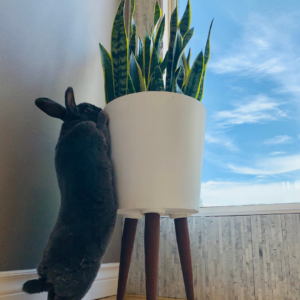 garlic, onions, yeast dough, and any processed foods containing the sweetener Xylitol.
garlic, onions, yeast dough, and any processed foods containing the sweetener Xylitol.
If you believe your pet has ingested any of these substances, contact your vet or local animal poison control center.
- Household & Automotive Products. Many household and automotive products also pose a poisoning risk to pets. Bleach, ammonia, household cleansers, jewelry cleaner, and antifreeze that contains ethylene glycol are highly dangerous to pets and should be stored in sealed containers where pets cannot access them.
Many common cosmetic products — such as soap, mouthwash, deodorant, nail polish, nail polish remover, nail glue, sunscreen, toothpaste, and shampoo — also present a poisoning risk to pets and should be stored away from places your dog or cat (or rabbit, ferret, or other furry friends) can reach.
- Human Medications. Many of these drugs are not appropriate for use by animals. Human doses of medications are often too potent to be safely ingested by pets.
 In Case of a Pet Poisoning Emergency
In Case of a Pet Poisoning Emergency
If you suspect that your pet has ingested a toxic substance, do not wait for symptoms to appear. Immediately call your veterinarian, the local vet emergency hospital, the Pet Poison Helpline at (855) 764-7661, or the ASPCA Animal Poison Control Center at (888) 426-4435.
To ensure your pet’s overall health, visit hvhospitals.org and schedule a routine checkup, today!




 While the one-million-pound goal was reached this past year, Humane Pennsylvania is also tackling systemic challenges beyond food with initiatives like low-cost veterinary services and community education.
While the one-million-pound goal was reached this past year, Humane Pennsylvania is also tackling systemic challenges beyond food with initiatives like low-cost veterinary services and community education. Dr. Alicia Simoneau’s 15-year journey with Humane Pennsylvania has been marked by a deep commitment to animal welfare and an unwavering passion for her work. As she celebrates this milestone, it’s clear that Dr. Simoneau’s contributions have been pivotal in shaping the compassionate and dynamic environment that defines Humane Pennsylvania today.
Dr. Alicia Simoneau’s 15-year journey with Humane Pennsylvania has been marked by a deep commitment to animal welfare and an unwavering passion for her work. As she celebrates this milestone, it’s clear that Dr. Simoneau’s contributions have been pivotal in shaping the compassionate and dynamic environment that defines Humane Pennsylvania today.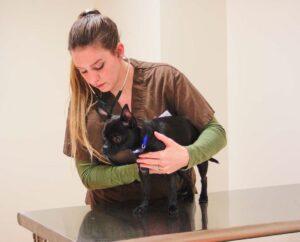
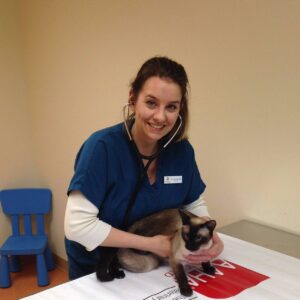 What’s one thing you’re learning now, and why is it important?
What’s one thing you’re learning now, and why is it important?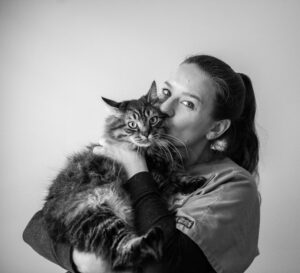
 After spending over 30 years in the animal welfare world, Humane Pennsylvania (HPA) President & CEO Karel Minor knows a thing or two about helping animals and their caretakers who love them. As the second longest-tenured leader in animal sheltering in Pennsylvania, he is looking back at the progress made and strides taken over his 20 years as CEO of Humane PA.
After spending over 30 years in the animal welfare world, Humane Pennsylvania (HPA) President & CEO Karel Minor knows a thing or two about helping animals and their caretakers who love them. As the second longest-tenured leader in animal sheltering in Pennsylvania, he is looking back at the progress made and strides taken over his 20 years as CEO of Humane PA. be done, usually with no real data to back it up, just opinion and gut feeling. Animal welfare felt hopeless and fatalistic and if you suggested we could save animals’ lives and help people try new things, our peers looked at us like we were stupid. If you suggested adopting cats at Halloween, waiving adoption fees, or adopting at Christmas, people thought you were insane. Twenty years ago, when I started at HPA, which was known as Berks Humane Society at that time, I met a core of staff, board, volunteers, and donors who were willing to be open-minded. They saw that what we had been doing wasn’t working- at least not for the 4,000 animals being euthanized each year- and they took the risk with me to try new and even taboo approaches. It worked, we kept it up, and we helped spread that attitude around the country.
be done, usually with no real data to back it up, just opinion and gut feeling. Animal welfare felt hopeless and fatalistic and if you suggested we could save animals’ lives and help people try new things, our peers looked at us like we were stupid. If you suggested adopting cats at Halloween, waiving adoption fees, or adopting at Christmas, people thought you were insane. Twenty years ago, when I started at HPA, which was known as Berks Humane Society at that time, I met a core of staff, board, volunteers, and donors who were willing to be open-minded. They saw that what we had been doing wasn’t working- at least not for the 4,000 animals being euthanized each year- and they took the risk with me to try new and even taboo approaches. It worked, we kept it up, and we helped spread that attitude around the country.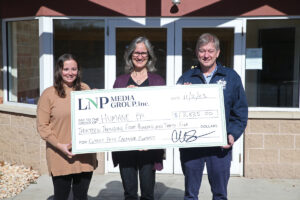 My greatest influence in animal welfare is Dr. Michael Moyer, who hired me at my first shelter 32 years ago. Back then, he was the extremely rare executive director who happened to be a veterinarian. He approached animal welfare like a scientist, used data, and encouraged me to do the same. However, my biggest professional influence is my wife, Dr. Kim Minor, who was one of the extremely rare educators who is a genuine genius, uses data and genuinely cares about doing what’s best for kids, even when it’s hard or personally risky. There is a bizarre similarity to how the education system writes off a lot of kids just like many animal shelters do with animals. Her example of doing what is right for each individual child and how that improves the well-being of children as a population has always motivated me to do the same for animals and the families they are attached to.
My greatest influence in animal welfare is Dr. Michael Moyer, who hired me at my first shelter 32 years ago. Back then, he was the extremely rare executive director who happened to be a veterinarian. He approached animal welfare like a scientist, used data, and encouraged me to do the same. However, my biggest professional influence is my wife, Dr. Kim Minor, who was one of the extremely rare educators who is a genuine genius, uses data and genuinely cares about doing what’s best for kids, even when it’s hard or personally risky. There is a bizarre similarity to how the education system writes off a lot of kids just like many animal shelters do with animals. Her example of doing what is right for each individual child and how that improves the well-being of children as a population has always motivated me to do the same for animals and the families they are attached to.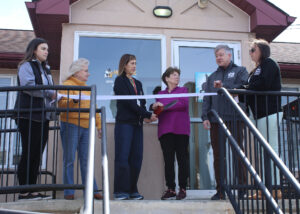 have been with HPA ranging from just one year to nearly twenty years. One person can’t succeed alone and we have built a group who take their work seriously and know they can make a concrete positive difference for the animals and people in our community.
have been with HPA ranging from just one year to nearly twenty years. One person can’t succeed alone and we have built a group who take their work seriously and know they can make a concrete positive difference for the animals and people in our community.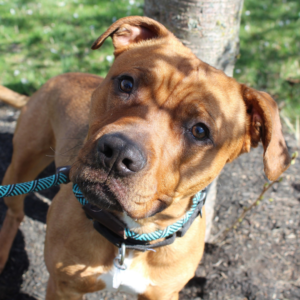 When a mosquito has a blood meal from a dog that has adult heartworms, the microfilaria is taken in by the mosquito and undergoes transformation to a larval stage, which can now be a source of infection for another dog. This larval stage parasite is injected from the mosquito to another dog with the next blood meal the mosquito takes.
When a mosquito has a blood meal from a dog that has adult heartworms, the microfilaria is taken in by the mosquito and undergoes transformation to a larval stage, which can now be a source of infection for another dog. This larval stage parasite is injected from the mosquito to another dog with the next blood meal the mosquito takes. larval stage of the heartworm before it has the chance to mature into an adult worm and cause excessive damage.
larval stage of the heartworm before it has the chance to mature into an adult worm and cause excessive damage.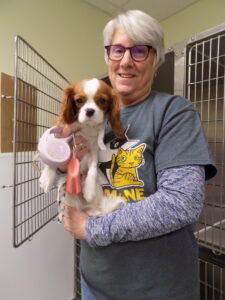 Thursday, February 23, 2024, is World Spay Day, and
Thursday, February 23, 2024, is World Spay Day, and 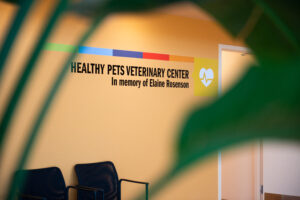
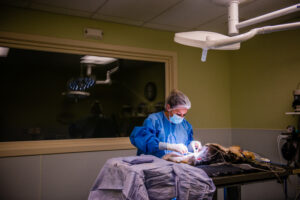
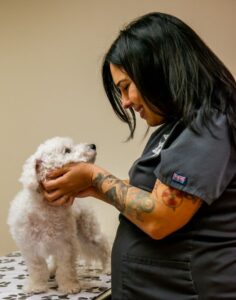 pets will prevent future costly issues such as uterine infections, cancers, and behavioral problems. For more information or to make an appointment, please visit our website:
pets will prevent future costly issues such as uterine infections, cancers, and behavioral problems. For more information or to make an appointment, please visit our website:  Humane PA is very excited to share details about our next steps to deliver the most impactful services to animals and people in our community! The needs of animals and the community have rapidly changed a great deal in recent years. In the last 20 years, the number of animals entering Humane PA shelters has declined by over 85%. Shelter euthanasia has declined by 99%. These numbers reflect national statistics.
Humane PA is very excited to share details about our next steps to deliver the most impactful services to animals and people in our community! The needs of animals and the community have rapidly changed a great deal in recent years. In the last 20 years, the number of animals entering Humane PA shelters has declined by over 85%. Shelter euthanasia has declined by 99%. These numbers reflect national statistics.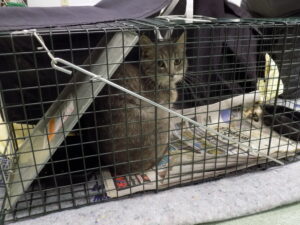 stemming from house pets, the limited and scattershot approaches for feral and free-roaming cats have not been as successful. That’s because sterilizing a few cats from this colony and a few from that colony leaves plenty of cats behind to breed. Humane PA is now taking a different approach, based on data and models with proven success. Since February, under the leadership of free-roaming cat whisperer, Alex Young, our Healthy Pets Initiative staff have been working directly with caretakers of colonies ranging from a half dozen to a hundred cats. One colony at a time, we have been sterilizing 100% (or as close as possible) of partner-managed colonies. By sterilizing every single cat in an extremely short time frame, we ensure there are no new litters, avoid boom and death cycles, and make it possible to effectively intervene when one or two new cats move into a colony.
stemming from house pets, the limited and scattershot approaches for feral and free-roaming cats have not been as successful. That’s because sterilizing a few cats from this colony and a few from that colony leaves plenty of cats behind to breed. Humane PA is now taking a different approach, based on data and models with proven success. Since February, under the leadership of free-roaming cat whisperer, Alex Young, our Healthy Pets Initiative staff have been working directly with caretakers of colonies ranging from a half dozen to a hundred cats. One colony at a time, we have been sterilizing 100% (or as close as possible) of partner-managed colonies. By sterilizing every single cat in an extremely short time frame, we ensure there are no new litters, avoid boom and death cycles, and make it possible to effectively intervene when one or two new cats move into a colony.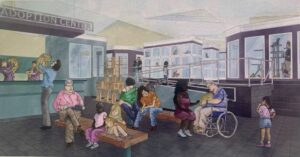
 We heard this loud and clear in a recent survey of our supporters. Over 90% of respondents said they thought there needed to be more affordable options. Over 60% of respondents told us that they had faced barriers of some type that prevented them from accessing, including cost or the health or behavioral challenges of their pets. Humane PA knows that some of these pets might end up in shelters if owners can no longer access routine boarding services. Humane PA also knows that there are few or no boarding options regularly available for emergency response, domestic violence victims, those facing health crises, and police dogs.
We heard this loud and clear in a recent survey of our supporters. Over 90% of respondents said they thought there needed to be more affordable options. Over 60% of respondents told us that they had faced barriers of some type that prevented them from accessing, including cost or the health or behavioral challenges of their pets. Humane PA knows that some of these pets might end up in shelters if owners can no longer access routine boarding services. Humane PA also knows that there are few or no boarding options regularly available for emergency response, domestic violence victims, those facing health crises, and police dogs. services may feel very different or even alien to what is perceived as “animal sheltering”. Although we had the kernel of an idea over a decade ago, since then several organizations around the nation have pioneered boarding programs to address the new needs of their communities to great success. These services are needed and they make a difference, whether it’s the pet of an adopter or a police dog of an officer needing to travel, the cats of someone displaced by fire, the dog of someone who is admitted to the hospital with a heart attack, or the pets of those trying to flee domestic violence
services may feel very different or even alien to what is perceived as “animal sheltering”. Although we had the kernel of an idea over a decade ago, since then several organizations around the nation have pioneered boarding programs to address the new needs of their communities to great success. These services are needed and they make a difference, whether it’s the pet of an adopter or a police dog of an officer needing to travel, the cats of someone displaced by fire, the dog of someone who is admitted to the hospital with a heart attack, or the pets of those trying to flee domestic violence I don’t like to admit it, but as an independent rescuer for decades, I became judgmental of people who struggled to give basic care to their pets. When I met pet owners who did not match my level of pet care, it was easy for me to immediately deem them as uncaring and irresponsible without knowing any further details! However, when I started working professionally in animal welfare, I met people who had the same empathy for the animals, but with far less resources. They were rescuing outside kittens, helping injured strays or inheriting pets from friends/family that can no longer care for them and sometimes, they need a little help.
I don’t like to admit it, but as an independent rescuer for decades, I became judgmental of people who struggled to give basic care to their pets. When I met pet owners who did not match my level of pet care, it was easy for me to immediately deem them as uncaring and irresponsible without knowing any further details! However, when I started working professionally in animal welfare, I met people who had the same empathy for the animals, but with far less resources. They were rescuing outside kittens, helping injured strays or inheriting pets from friends/family that can no longer care for them and sometimes, they need a little help.  turn, leaves more space at the shelter for the animals that really need a safe place, vet care and possibly a new family (or are reunited!).
turn, leaves more space at the shelter for the animals that really need a safe place, vet care and possibly a new family (or are reunited!). 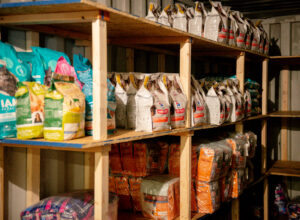 benefit from our organization’s enrollment in a food program that provides the same brand and type of food to everyone. Ongoing participation in this program results in a win-win situation:
benefit from our organization’s enrollment in a food program that provides the same brand and type of food to everyone. Ongoing participation in this program results in a win-win situation:
 There’s nothing more exciting to a pup than heading to the wide-open spaces of Humane Pennsylvania’s
There’s nothing more exciting to a pup than heading to the wide-open spaces of Humane Pennsylvania’s  Did you know that Humane Pennsylvania is a proud sponsor of the
Did you know that Humane Pennsylvania is a proud sponsor of the 
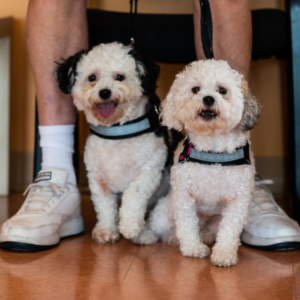 The perfect way to show that you appreciate your pet is by
The perfect way to show that you appreciate your pet is by 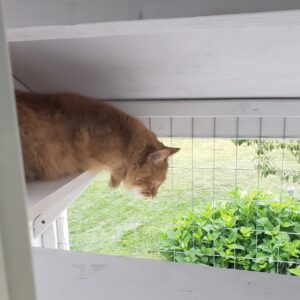 Many refer to me as a “crazy cat lady,” but I don’t mind. I have spent more than 20 years advocating for the rights of and implementing humane management of free-roaming/community/feral cats in Berks County. I took care of 29 inside cats for four years and have volunteered in animal rescue for my entire life.
Many refer to me as a “crazy cat lady,” but I don’t mind. I have spent more than 20 years advocating for the rights of and implementing humane management of free-roaming/community/feral cats in Berks County. I took care of 29 inside cats for four years and have volunteered in animal rescue for my entire life.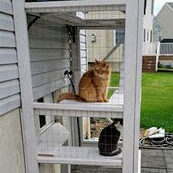
 Although your cat still exhibits some wildness about them, rest assured that they are dependent on you to provide healthy food, adequate shelter, proper stimulation, and an annual veterinary exam to keep them in tip-top shape.
Although your cat still exhibits some wildness about them, rest assured that they are dependent on you to provide healthy food, adequate shelter, proper stimulation, and an annual veterinary exam to keep them in tip-top shape.